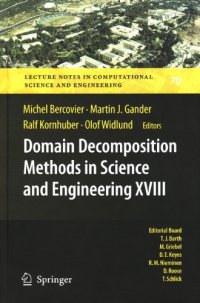
Ebook: Domain decomposition methods in science and engineering XVIII
- Genre: Technique
- Tags: Computational Mathematics and Numerical Analysis, Mathematical Modeling and Industrial Mathematics, Computational Science and Engineering, Numerical and Computational Physics, Mathematics of Computing
- Series: Lecture Notes in Computational Science and Engineering 70
- Year: 2009
- Publisher: Springer-Verlag Berlin Heidelberg
- Edition: 1
- Language: English
- pdf
th This volume contains a selection of 41 refereed papers presented at the 18 International Conference of Domain Decomposition Methods hosted by the School of ComputerScience and Engineering(CSE) of the Hebrew Universityof Jerusalem, Israel, January 12–17, 2008. 1 Background of the Conference Series The International Conference on Domain Decomposition Methods has been held in twelve countries throughout Asia, Europe, the Middle East, and North America, beginning in Paris in 1987. Originally held annually, it is now spaced at roughly 18-month intervals. A complete list of past meetings appears below. The principal technical content of the conference has always been mathematical, but the principal motivation has been to make ef cient use of distributed memory computers for complex applications arising in science and engineering. The leading 15 such computers, at the “petascale” characterized by 10 oating point operations per second of processing power and as many Bytes of application-addressablem- ory, now marshal more than 200,000 independentprocessor cores, and systems with many millions of cores are expected soon. There is essentially no alternative to - main decomposition as a stratagem for parallelization at such scales. Contributions from mathematicians, computerscientists, engineers,and scientists are together n- essary in addressing the challenge of scale, and all are important to this conference.
These are the proceedings of the 18th international conference on domain decomposition methods in science and engineering, held in Jerusalem, January 12-17, 2008. Domain decomposition methods are iterative methods for solving the often very large linear or nonlinear systems of algebraic equations that arise when various problems in continuum mechanics are discretized using finite elements. They are designed for massively parallel computers and take the memory hierarchy of such systems into account. This is essential for approaching peak floating point performance. There is an increasingly well developed theory which is having a direct impact on the development and improvements of these algorithms.